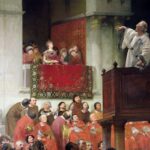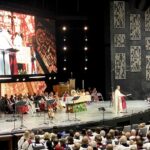
By Mark Tooley
Hundreds packed the First United Methodist Church in Sioux Falls, South Dakota, on October 25 to honor Senator George McGovern, the 1972 Democratic presidential candidate who died earlier this week. He was one of the last great prairie progressives who were deeply shaped by Social Gospel liberal Protestantism. The son of a Wesleyan Methodist minister, McGovern himself studied for the ministry at a Methodist seminary. In his later decades he was active in the United Methodist Church, whose liberal policies replicated his own, and some of whose bishops openly backed his presidential bid against Richard Nixon.
Fueled by the 1908 Methodist Social Creed that was ecumenically endorsed by the old Federal Council of Churches, early 20th century liberal Methodism by the 1920s and 1930s was anti-war, suspicious of capitalism, and supremely confident about perfecting society through reforming legislation. Young McGovern must have eagerly…
Read more here.




Comment by J S Lang on November 1, 2012 at 11:04 am
I worked for the United Methodist Publishing House back in the Reagan years, and to those liberal Methodists, “faith” and “politics” were the same thing. Many of them were nice folks, generally conservative in their own lifestyles, but when the UM bishops or General Conference took a liberal position on any issue, it was as if God had spoken from Sinai. Reagan was the Evil Beast to them, and they despised those nasty “fundamentalists” (they wouldn’t say the word “evangelicals,” because they knew “fundamentalists” sounded worse) who were fleeing the denomination or not buying into the UM’s “official” positions on social issues. Occasionally they spoke nostalgically of George McGovern and were clueless how such a fine example of Christian politician managed to carry only one state in the 1972 election.
Mark Tooley was generous in hoping that McGovern is now “Leaning on the Everlasting Arms.” No one can read another’s soul, of course, but I don’t have an optimistic view of the eternal destiny of someone who claimed to be Christian but whose entire life was dedicated to negating Jesus’ statement “My kingdom is not of this world.”